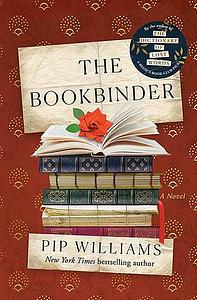Take a photo of a barcode or cover
medium-paced
Plot or Character Driven:
Character
Loveable characters:
Yes
Diverse cast of characters:
Yes
Flaws of characters a main focus:
No
I was definitely not disappointed by Pip Williams’ writing, it just is so thoroughly thought out and researched. I love reading a fiction book whilst still learning random information about stuff (bookbinding? so random but now I feel I could be a professional bookbinder)
I feel like this book also helped me get a better feel for the vibes around WW1, although as it is obviously fiction I am obviously aware that there is a lot more to it and a non fiction book would be better for this information.
I did surprisingly really like the crossover between the two books (the dictionary of lost words). Sometimes these crossovers are unnecessary and cringey and feel like they are just there for the readers enjoyment rather than the plot but I felt it tied it together really well.
I think a part I didn’t like was that it felt a little flip-floppy with baastian and Peggy.And (perhaps controversially) I almost wished they wouldn’t have stayed together at the end. My thought process on this is that in TDOLW the same thing happened where we have this really strong independent female lead and they are firm in their commitment to their studies and career (and reject marriage), only then to go back on what they say and pine for a man. I know that feminism is allowing the choice to do that, and I tried to be on board with that for TDOLW but for it to happen for a second time is just a bit annoying. Like let’s be real, baastian wants children and Peggy explicitly said she can’t be a wife, mother and scholar at the same time. So what’s going to happen in the future? Perhaps that’s not true, and she can be all at once and still be content with her life, but if this is how she feels then why are they together in the end? maybe if there was a clearer conversation between the two I could get more in board, or understand why Peggy had this change in character? I just felt like the author wanted a happy ending, and I wanted that too but perhaps my happy ending is different. I think there is something powerful in knowing what you want and standing by it, especially during this time of the feminism movement. That ending just took it away from it a little for me.
I feel like this book also helped me get a better feel for the vibes around WW1, although as it is obviously fiction I am obviously aware that there is a lot more to it and a non fiction book would be better for this information.
I did surprisingly really like the crossover between the two books (the dictionary of lost words). Sometimes these crossovers are unnecessary and cringey and feel like they are just there for the readers enjoyment rather than the plot but I felt it tied it together really well.
I think a part I didn’t like was that it felt a little flip-floppy with baastian and Peggy.
fast-paced
emotional
hopeful
reflective
slow-paced
Plot or Character Driven:
Character
Strong character development:
Yes
Loveable characters:
Yes
Diverse cast of characters:
No
Flaws of characters a main focus:
Complicated
What a wonderful story about a part of our shared history I still don't know all that much about even though it's only about a century ago, the WW I era. I loved getting a glimpse of the (by now) old fashioned book manufactoring and the women behind it in Oxfor. I loved getting a glimpse into the world of working women in these times, because whe don't get that often enough. The characters here were so well rounded, the prose beautiful, what a lovely, lovely book.(30 May 2025)
[I've stopped rating books]
[I've stopped rating books]
adventurous
funny
lighthearted
medium-paced
Plot or Character Driven:
Character
Strong character development:
Yes
Loveable characters:
Yes
Diverse cast of characters:
Yes
Flaws of characters a main focus:
No
⭐️⭐️⭐️⭐️⭐️
Review:
A historical fiction with neurodivergent representation, disabilities, refugees and the aftermath of being at war.
It shows so many of the different jobs that women had to fill during the Great War: Red Cross, nurses, reading to people recovering in hospitals/nursing facilities, libraries, publishers, etc. It showed the love and bond of sisters and their found family. They learn new skills and how to depend on others. It shows true bravery and sacrifice, while still somehow remaining cozy and oh so hopeful. It shows the real struggle of women to get the education that they so desired. These characters, including the men, supported these women throughout the story.
More importantly, I want this boat! Calliope, the library on the water. It’s everything two sisters could wish for!
Quotes:
They were gathered in groups according to their occupation; the state of their aprons and hands made it easy to recognise them. They filled the spaces between the Bible side and the Learned side, …
(Ch. 1)
Why do we have so many books? I liked to ask. To expand your world, she would always say.
(Ch. 2)
Some men hardly need an excuse to behave badly and as far as excuses go, war is a good one.
(Ch. 2)
He’s asked three times, she said, but I don’t love him in the right way. She’d had the courage to say no, but she liked him enough to let him keep loving her.
(Ch. 3)
A secret, of course, and a declaration of love. He wanted to win her over with this gift, shore up their relationship.
Note: Yes, but he is making her a book…
(Ch. 5)
‘Glaire, grease, gold,’ echoed Maude. ‘What’s glaire?’ I asked. Bindery girls didn’t learn to gild. ‘Egg white, essentially,’ said Eb. ‘It helps prepare the leather to take the gilt.’
(Ch. 7)
‘Water, water everywhere, Miss Bruce, nor any drop to drink.’ She smiled. ‘Coleridge,’ she said. ‘The Rime of the Ancient Mariner,’ I said, lobbing the shuttlecock back over the net. She placed a hand on my shoulder. ‘Keep an eye out for the albatross, Miss Jones. And take care not to shoot it.’
(Ch. 15)
‘Tilda wants you to send more stars, Maudie. They make the nurses feel safe.’ She frowned. ‘Tilda is safe?’ I wasn’t sure. ‘Of course,’ I said. ‘Not even the Germans would drop bombs on a hospital.’
(Ch. 18)
She understood, I think, that most of what people said was meaningless. That people spoke to fill the silence or pass the time; that, despite our mastery of words and our ability to put them together in infinitely varied ways, most of us struggled to say what we really meant. Maude filtered conversation like a prism filters light. She broke it down so that each phrase could be understood as an articulation of something singular. The truth of what she said could be inconvenient; sometimes it made life easier to misunderstand her. But I realised that what confused most people soothed Lotte. I wasn’t sure how, but she had understood Maude from the first, recognised her somehow and felt comfortable. She didn’t misunderstand Maude, and Maude was beginning to love her for it.
(Ch. 22)
You smell like a new book–it’s positively intoxicating.’
(Ch. 22)
‘She takes up so little room,’ I said. He sighed. ‘In the end, we all do.’
(Ch. 33)
‘Of course I’ve heard of her, Peg, I’m not a philistine. I’m sure Jane Eyre is one of my favourite novels.’ ‘You’re sure?’ ‘Well, I’m sure it should be.’
(Ch. 34)
‘Calliope’s Library,’ she read aloud. She held the ledger in her hand; her eyebrows were raised. She made it sound like a school project. ‘What?’ I asked. ‘Is our home not grand enough for a library?’ Gwen laughed and looked around. ‘I’m afraid it might sink under the weight of all these books.’
(Ch. 36)
‘And that was worse,’ he said. ‘But now, to give you pleasure, it feels like I am filling your lungs with air, warming your blood, making your heart beat.’ ‘Proof of life.’
(Ch. 37)
Her face clouded. ‘What do you mean, mostly?’ I swallowed, took another sip. Her discomfort was strangely pleasing. ‘I can think for myself, Gwen. I don’t always agree with what I’ve read.’ ‘Oh, God,’ she said. ‘Independent thought.’
(Ch. 41)
‘And to be honest, the only way to know what Homer wrote is to learn the language that Homer wrote in, otherwise you are at the mercy of the translator, their times, their perspective. Their gender,’ she said.
(Ch. 42)
‘Why does it matter what they’re called?’ I asked. She smiled. ‘The words used to describe us define our value to society and determine our capacity to contribute. They also’–and again she poked at the translations–‘tell others how to feel about us, how to judge us.’
(Ch. 42)
‘There should be a memorial for women like Lotte,’ Gwen finally said, her voice lower, her words slower. When the refreshments came, Gwen poured milk into her teacup and put a slice of lemon into mine. She checked to see how steeped the tea was. ‘Every town will have a memorial for the men,’
(Ch. 51)
emotional
slow-paced
Plot or Character Driven:
Character
Strong character development:
Yes
Loveable characters:
Yes
Diverse cast of characters:
No
Flaws of characters a main focus:
Yes
emotional
hopeful
informative
inspiring
sad
tense
medium-paced
Plot or Character Driven:
A mix
Strong character development:
Yes
Loveable characters:
Yes
Diverse cast of characters:
Yes
Flaws of characters a main focus:
Complicated
challenging
emotional
informative
inspiring
reflective
sad
slow-paced
Plot or Character Driven:
Character
Strong character development:
Yes
Loveable characters:
Yes
Diverse cast of characters:
Yes
Flaws of characters a main focus:
No
reflective
slow-paced
Plot or Character Driven:
Character
Strong character development:
Yes
Loveable characters:
Yes
emotional
hopeful
informative
reflective
sad
tense
medium-paced
Plot or Character Driven:
Character
Strong character development:
Yes
Loveable characters:
Yes
Diverse cast of characters:
Complicated
Flaws of characters a main focus:
Complicated
A moving book about chosen family and a fresh perspective on the realities of British women in The Great War. Herstory, working class history, and so much more. Written by the author of 'The Dictionary of Lost Words' and set in the same world, I couldn't help comparing the two - I definitely preferred the witty language play of Williams' debut novel to the more explicit scenes in this one. Adore the concept but felt like the writing was much weaker compared to its precursor.







